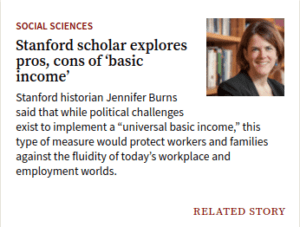Until now, universal basic income – a concept that would give all members of society an unconditional, guaranteed cash payment – has received limited attention among U.S. policymakers. But the coronavirus pandemic may change all that, says Stanford historian Jennifer Burns.


Jennifer Burns, associate professor of history, says a universal basic income program could help protect workers who have hit rock bottom. (Image credit: Courtesy Jennifer Burns)
As lawmakers look for ways to soften the economic blow of the outbreak, one idea is to give qualified Americans a lump sum of money. Could this one-off handout lead to a more serious consideration of guaranteed income for Americans? Burns believes so.
Here, Burns, who is an associate professor of history in the Stanford School of Humanities and Sciences and a research fellow at the Hoover Institution, discusses the complicated history of UBI and how the political logjam that prevented it from being a topic of serious discussion in Washington D.C. may finally be broken.
Part of the proposed coronavirus stimulus plan is a direct cash payment to qualified Americans. Would you consider the current proposal an example of universal basic income (UBI)?
The proposed reforms really only resemble a UBI in one respect: the payment of a cash benefit rather than an in-kind benefit, such as food stamps, vouchers or coverage of medical expenses. There is, however, a similar rationale. In a crisis situation when needs are likely to be both pervasive and highly diverse, such as the coronavirus emergency, a cash payment seems most efficient on many levels. It can go out to recipients faster, and they can immediately use it to meet their most pressing needs, as determined by the best judgment of the individual and household. Similar benefits apply to a long term UBI.
The primary difference between a UBI and the measures now under discussion is that they are being considered as a sort of emergency stopgap, not an ongoing program. This eliminates one of the benefits of UBI, that it provides a measure of income stability and enables long term planning.
Why hasn’t UBI gained more traction among the nation’s policymakers?
Over the past five years, there has been a robust philosophical and policy conversation about UBI that has yielded a range of new proposals and pilot programs. Andrew Yang is the best-known proponent but he is really the tip of the iceberg. However, most of this conversation has been among Democrats and liberals. This is unusual in the overall history of UBI, which in the 1960s and 1970s had wide bi-partisan support. So, the most consequential effect of the coronavirus may be to break the logjam on conservatives or Republicans discussing the pros and cons of cash grants and guaranteed income.
Are there any examples in history of when these types of handouts/stimulus packages have been beneficial?
The United States has a long-running UBI type program in the form of the Alaska Permanent Fund Dividend, which by all accounts has worked well for Alaskans over many decades. The main challenge of this program has been political, in terms of preserving the funding amid a wider budget crisis. Politics is the art of the trade-off, and since UBI is diffuse and diverse in its outcomes, it can be harder to defend than a targeted program aimed at a sympathetic demographic. Historically, the elderly, veterans, widows, and mothers have all been regarded as worthy of charity, with a reluctance to aid low-income workers in general.
The coronavirus, which does not discriminate, seems to have temporarily suspended this calculus, but probably not for long.
The economist Milton Friedman advocated for something very similar to UBI. As a scholar of Friedman’s work, what conditions do you think he would be asking for right now? Would he consider a cash payment enough?

Although Friedman is known as an extreme free-market economist, he was very flexible when it came to emergency situations like depressions and war, where he definitely saw a role for government. His most famous research was on the role the Federal Reserve could play in alleviating economic contractions. As such, he would applaud the general approach of the Fed, which has been to act quickly to get out in front of the situation. In terms of UBI or cash grants, this was a policy he favored on a permanent basis, so it’s likely he would also support it as a short-term measure. In his perspective, a cash grant was far preferable to interventions like a minimum wage or a guaranteed job.
Are you surprised that UBI is being taken seriously again?
As a historian of ideas, it’s always fascinating to watch how an idea that is outside the bounds of plausibility or polite conversation can suddenly crash the party. I’m constantly reminded in my research how many ideas or attitudes we consider common sense are very new and would have been considered completely bizarre or unthinkable even a generation before. In terms of Friedman, this can be seen again and again. He supported a volunteer army, vouchers for public schools, drug legalization, and floating international exchange rates, which were all considered ridiculous, even dangerous ideas when he first argued for them. By the time he died, they were realities, or in the case of drug legalization, heading in that direction.
Indeed, UBI was one of the few policies he strongly advocated that did not pass. Individuals and societies are pretty quick to adapt and forget what came before. We may be at that moment now with UBI – a policy idea that was outlandish and fringe a few months ago is now a major topic of discussion in Washington, DC.





















